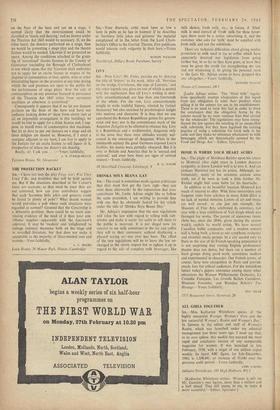SIR,—The crack is sometimes made against politicians that they must
first get the facts right—they can twist them afterwards! In the expectation that your contributor Mr. Leslie Adrian might like to follow the same precedent, I am writing to provide him with one that he obviously lacked for his article under the title of 'Drinka Soya Beana Day.'
Mr. Adrian's impression that the new regulations will relax the law with regard to selling milk sub- stitutes and make it easier for cafés to sell them to the public is incorrect. It is not illegal now for caterers to use milk substitutes in the tea and coffee they sell to their customers, without displaying a placard saying so—nor ever has been. The effect of the new regulations will be to leave the law un- changed in the above respect but to tighten it up in regard to the sale of complete milk beverages, like
milk shakes, fresh milk, etc.; in future, if 'filled' milk is used instead of 'fresh' milk for these bever- ages there must be a notice advertising it, and the customer who asks for 'milk' must be supplied with fresh milk and not the substitute.
There are technical difficulties about giving similar protection to milk used in tea or coffee which have apparently deterred our legislators from going farther but, in so far as they have gone, at least they must be given the credit for strengthening the law and not weakening it. In giving his personal twist to, the (acts Mr. Adrian seems to have dropped this one altogether.—Yours faithfully, House of Commons, SW I
RICHARD NLail NI
[Leslie Adrian writes: 'The "filled milk" regula- tions specifically exempt wholesalers of this liquid from any obligation to label their product when selling it to the caterer for use in his establishment. There is no need to twist this fact in order to draw the conclusion that the obligation borne by the caterer would be no more onerous than that carried by the wholesaler. The regulations may have streng- thened the law against the retailing of an unspecified milk substitute, but they have legalised the existing practice of using a substitute for fresh milk in the cafes and they make no reference whatsoever to milk beverages, which arc theoretically covered by the Food and Drugs Act.'—Editor, Spectator.]






































 Previous page
Previous page